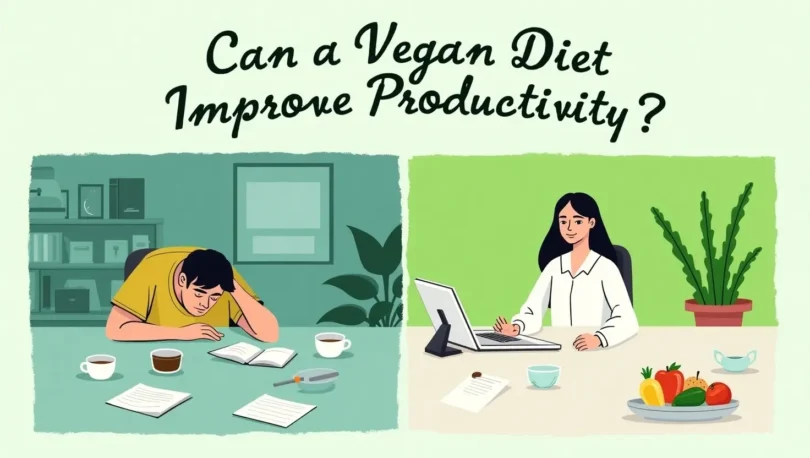In today’s fast-paced world, productivity is a key factor in personal and professional success. From entrepreneurs to students and working professionals, everyone is looking for ways to stay focused, energized, and efficient. While factors like sleep, exercise, and time management play a role, diet is often overlooked as a crucial element in boosting performance. One diet gaining popularity for its potential cognitive and physical benefits is the vegan diet. Many high achievers, from athletes to business leaders, have embraced plant-based eating, claiming it enhances their focus, energy, and overall well-being. But is there any scientific evidence to support the link between a vegan diet and productivity?
In this article, we’ll explore how a plant-based diet affects brain function, energy levels, and overall work performance. We’ll dive into the key nutrients that fuel focus, the psychological benefits of eating vegan, and practical tips to optimize productivity with a well-balanced vegan diet. Let’s separate myth from science and discover whether going vegan can truly be a game-changer for productivity!
Headline
How a Vegan Diet Impacts Brain Function and Focus
The Psychological and Physical Benefits of a Vegan Diet
Practical Tips to Maximize Productivity with a Vegan Diet
How a Vegan Diet Impacts Brain Function and Focus
The Role of Key Nutrients in Mental Performance
What we eat directly impacts how well our brain functions. Just like a car needs the right fuel to run efficiently, our brains require specific nutrients to support cognitive processes such as focus, memory, and decision-making. A well-planned vegan diet can provide all the essential nutrients needed to enhance mental performance, but it’s important to pay attention to certain key vitamins and minerals.
Vitamin B12 & Omega-3: Essential for Cognitive Function
Vitamin B12 is crucial for nerve function and brain health, playing a significant role in the production of red blood cells and the maintenance of the nervous system. A deficiency in B12 can lead to fatigue, memory problems, and even difficulty concentrating—issues that can hinder productivity. Since B12 is primarily found in animal-based products, vegans should focus on fortified foods (such as plant-based milks, nutritional yeast, and cereals) or take a B12 supplement to ensure optimal cognitive function.
Similarly, omega-3 fatty acids (specifically DHA and EPA) are essential for brain health, aiding in neurotransmitter function, reducing inflammation, and improving mood and focus. While fish is the most well-known source, vegans can obtain omega-3s from flaxseeds, chia seeds, walnuts, hemp seeds, and algae-based supplements. Ensuring adequate omega-3 intake can help prevent brain fog and keep cognitive performance at its peak.
Iron & Antioxidants: Supporting Oxygen Flow and Reducing Brain Fog
Iron plays a critical role in transporting oxygen to the brain. When iron levels are low, it can result in fatigue, difficulty concentrating, and reduced cognitive function. While plant-based iron sources like lentils, chickpeas, spinach, and quinoa are abundant, non-heme iron (the type found in plants) is not as easily absorbed as heme iron from animal products. To enhance iron absorption, it’s beneficial to pair iron-rich foods with vitamin C sources like citrus fruits, bell peppers, and tomatoes.
In addition to iron, antioxidants play a major role in protecting brain cells from oxidative stress. Foods rich in antioxidants—such as berries, dark leafy greens, nuts, and seeds—help combat free radicals that can damage brain cells and impair cognitive function. A diet high in antioxidants supports mental clarity, sharp thinking, and long-term brain health.
Plant-Based Proteins: Building Blocks for Neurotransmitters
Proteins are essential for producing neurotransmitters, the chemical messengers that enable brain cells to communicate effectively. Dopamine and serotonin, which influence focus, motivation, and mood, are synthesized from amino acids derived from protein. Vegan-friendly protein sources such as tofu, tempeh, lentils, quinoa, nuts, and beans provide the amino acids necessary to keep neurotransmitter levels balanced.
Additionally, incorporating complex carbohydrates like whole grains and legumes along with proteins ensures a steady release of energy throughout the day, preventing energy crashes that can disrupt productivity.
Final Thoughts
By paying attention to these key nutrients, individuals following a vegan diet can optimize their cognitive function, maintain mental clarity, and sustain high levels of productivity. The key is to ensure a balanced and well-planned diet that meets all nutritional needs, ultimately fueling both the brain and body for peak performance.
Stable Energy Levels for Better Productivity
One of the biggest challenges to maintaining high productivity throughout the day is avoiding energy crashes. Many people experience sudden dips in focus and motivation, often due to poor dietary choices that cause blood sugar spikes and crashes. A well-balanced vegan diet can help regulate energy levels naturally, providing steady fuel for the brain and body. Let’s explore how plant-based eating supports sustained energy and mental clarity, ensuring optimal productivity.
Avoiding Energy Crashes: How Plant-Based Whole Foods Regulate Blood Sugar
Many processed and refined foods—such as white bread, sugary snacks, and sodas—cause rapid spikes in blood sugar levels, followed by a crash that leaves you feeling sluggish and unfocused. This cycle of highs and lows can severely impact productivity, making it harder to concentrate on tasks.
A vegan diet rich in whole foods provides complex carbohydrates that break down slowly, ensuring a steady release of glucose into the bloodstream. Unlike refined carbs, whole plant-based foods contain fiber, healthy fats, and proteins that help stabilize blood sugar levels. This prevents the rollercoaster effect of energy spikes and crashes, allowing for sustained focus and endurance throughout the day.
Some of the best vegan foods for steady energy levels include:
- Whole grains (quinoa, brown rice, oats)
- Legumes (lentils, chickpeas, black beans)
- Fruits with fiber (bananas, apples, berries)
- Nuts and seeds (almonds, walnuts, flaxseeds)
By prioritizing these slow-digesting, nutrient-dense foods, vegans can enhance their stamina, avoid brain fog, and maintain peak performance at work or school.
Slow-Digesting Carbs: The Best Fuel for Long-Lasting Energy
Carbohydrates are the body’s primary energy source, but not all carbs are created equal. Simple carbs (like white bread, pastries, and candy) cause quick blood sugar spikes, leading to a short burst of energy followed by a crash. In contrast, slow-digesting complex carbohydrates found in whole plant-based foods release energy gradually, keeping energy levels consistent and stable.
Some of the best slow-digesting carbs for productivity include:
- Quinoa – A complete protein and a great source of fiber and iron.
- Sweet potatoes – Packed with complex carbs, fiber, and vitamin A for brain function.
- Lentils and chickpeas – Provide a protein-carb combo that fuels both the body and brain.
- Oats – Rich in beta-glucan fiber, which helps maintain energy balance and focus.
By including these complex carbs in meals and snacks, individuals can sustain their energy levels for hours, preventing mid-day slumps that disrupt productivity.
Hydration & Brain Performance: The Role of Fruits and Vegetables
Dehydration is a common but often overlooked cause of fatigue and poor concentration. Even mild dehydration can lead to brain fog, reduced cognitive function, and decreased alertness—all of which negatively impact productivity. While drinking enough water is essential, a vegan diet naturally supports hydration due to its high content of water-rich foods.
Fruits and vegetables with high water content include:
- Cucumber – 96% water, great for hydration and refreshment.
- Watermelon – Contains electrolytes that help maintain focus.
- Oranges – High in vitamin C and water, promoting energy metabolism.
- Leafy greens (spinach, kale) – Rich in magnesium and antioxidants, which support brain function.
By staying hydrated and incorporating plenty of water-rich foods, vegans can prevent dehydration-related fatigue and ensure their minds remain sharp throughout the day.
Final Thoughts
Maintaining stable energy levels is essential for productivity, and a well-balanced vegan diet provides the nutrients necessary for sustained focus, endurance, and mental clarity. By consuming slow-digesting whole foods, avoiding refined sugar spikes, and staying hydrated, individuals can optimize their performance and maintain peak energy levels without relying on stimulants like caffeine or sugar.
Switching to a nutrient-dense, plant-based diet is not just a choice for better health—it’s a powerful tool for unlocking long-term productivity and efficiency.
The Psychological and Physical Benefits of a Vegan Diet
Reduced Inflammation and Stress
Chronic inflammation and stress are two major factors that can negatively impact productivity. Inflammation in the body, especially in the brain, has been linked to mental fatigue, brain fog, decreased cognitive function, and even mood disorders like anxiety and depression. Additionally, high stress levels can lead to poor concentration, reduced motivation, and lower overall performance.
A well-planned vegan diet rich in anti-inflammatory foods can help combat these issues, promoting a clearer mind, improved mood, and better resilience to stress. Let’s explore how plant-based eating can help reduce inflammation and enhance mental well-being.
How a Plant-Based Diet Reduces Inflammation
Inflammation is the body’s natural response to injury, infection, or toxins, but chronic inflammation—often caused by poor diet, stress, and environmental factors—can have harmful effects on brain health and productivity. Processed foods, refined sugars, and saturated fats from animal products are known to increase inflammation, which can impair brain function over time.
On the other hand, many plant-based foods are rich in antioxidants and phytonutrients, which help combat oxidative stress, neutralize free radicals, and reduce inflammation in the body and brain. Some of the best anti-inflammatory vegan foods include:
- Leafy greens (spinach, kale, Swiss chard) – Packed with vitamins A, C, and K, which help reduce oxidative stress.
- Berries (blueberries, strawberries, blackberries) – High in antioxidants like flavonoids, which improve brain function.
- Nuts and seeds (walnuts, flaxseeds, chia seeds) – Contain omega-3 fatty acids, which reduce inflammation in the brain.
- Turmeric – Contains curcumin, a powerful compound known for its strong anti-inflammatory effects.
- Ginger – Helps reduce inflammation and supports digestion, which is linked to mood regulation.
- Green tea – Rich in catechins, which support brain function and lower stress-related inflammation.
By incorporating these anti-inflammatory foods into daily meals, individuals following a vegan diet can support long-term brain health, reduce mental fatigue, and maintain better focus and clarity.
The Connection Between Diet and Stress Reduction
Stress triggers the release of cortisol, the body’s primary stress hormone. While cortisol is helpful in short bursts, chronic stress leads to prolonged high cortisol levels, which can result in:
- Impaired memory and concentration
- Increased anxiety and mood swings
- Fatigue and burnout
A nutrient-dense vegan diet can naturally help regulate stress hormones and promote a sense of calm and focus. Key nutrients that help reduce stress include:
- Magnesium (found in nuts, seeds, and dark leafy greens) – Helps regulate cortisol levels and promotes relaxation.
- Vitamin C (found in citrus fruits, bell peppers, and strawberries) – Lowers stress hormones and boosts the immune system.
- B Vitamins (found in whole grains, legumes, and avocados) – Support neurotransmitter function, improving mood and focus.
- Tryptophan (found in bananas, oats, and seeds) – A precursor to serotonin, the “feel-good” hormone that promotes emotional balance.
How a Vegan Diet Supports a Healthy Gut-Brain Connection
Emerging research suggests that the gut and brain are closely connected, meaning that what we eat directly affects our mental state. A diet high in processed and inflammatory foods can disrupt gut bacteria, leading to increased stress, anxiety, and even depression.
A fiber-rich vegan diet supports a healthy gut microbiome, which plays a vital role in producing neurotransmitters like serotonin and dopamine—both essential for mood stability and mental clarity. Foods that promote gut health include:
- Fermented foods (kimchi, sauerkraut, kombucha, miso) – Contain probiotics that support healthy gut bacteria.
- Prebiotic foods (garlic, onions, asparagus, bananas, oats) – Feed beneficial gut bacteria, improving digestion and mood.
- Legumes and whole grains – Provide fiber that helps maintain a balanced gut microbiome.
By nourishing the gut with plant-based whole foods, individuals can experience improved stress resilience, better emotional balance, and enhanced cognitive function, all of which contribute to higher productivity levels.
Final Thoughts
Chronic inflammation and stress are two of the biggest obstacles to peak productivity. Fortunately, a well-balanced vegan diet rich in anti-inflammatory foods, stress-reducing nutrients, and gut-friendly ingredients can help support brain health, boost mood, and improve focus. By making mindful dietary choices, individuals can enhance their mental well-being, reduce fatigue, and unlock their full cognitive potential, ultimately leading to better performance in both personal and professional life.
Better Sleep and Recovery for Peak Performance
A good night’s sleep is one of the most important yet often overlooked factors in maintaining high productivity. Sleep affects nearly every aspect of brain function, including memory, focus, decision-making, and emotional regulation. Without quality rest, energy levels plummet, concentration wanes, and productivity suffers.
A well-balanced vegan diet can play a significant role in improving sleep quality by providing key nutrients that promote relaxation, support the sleep cycle, and enhance recovery. Let’s explore how plant-based eating can help you sleep better, recover faster, and perform at your best.
How a Vegan Diet Promotes Better Sleep
Certain vitamins, minerals, and plant compounds naturally support the body’s ability to fall asleep and stay asleep. Unlike highly processed foods, which can interfere with sleep due to high sugar and caffeine content, whole plant-based foods provide the right nutrients for relaxation and deep rest.
1. Magnesium: The Sleep-Boosting Mineral
Magnesium plays a crucial role in relaxing the nervous system and regulating melatonin, the hormone that controls sleep. A deficiency in magnesium has been linked to insomnia, restlessness, and poor sleep quality. Fortunately, a vegan diet provides many excellent sources of magnesium, including:
- Dark leafy greens (spinach, kale, Swiss chard)
- Pumpkin seeds and sunflower seeds
- Almonds and cashews
- Bananas
- Legumes (black beans, lentils, chickpeas)
Eating magnesium-rich foods, especially in the evening, can help relax the muscles, calm the mind, and improve overall sleep quality.
2. Tryptophan: A Natural Sleep Aid
Tryptophan is an essential amino acid that helps the body produce serotonin, which in turn is converted into melatonin—the hormone responsible for sleep regulation. While tryptophan is often associated with turkey, many vegan foods contain this important sleep-promoting compound, including:
- Oats – Helps boost serotonin levels, making it easier to fall asleep.
- Bananas – Contain tryptophan along with magnesium, which aids relaxation.
- Nuts and seeds (pumpkin seeds, sunflower seeds, almonds, walnuts) – Help increase serotonin production.
- Tofu and soy products – Rich in tryptophan, making them great for plant-based eaters.
Incorporating these foods into dinner or an evening snack can naturally improve sleep onset and duration.
3. Herbal Teas and Sleep-Supporting Beverages
Caffeine, found in coffee, tea, and energy drinks, can interfere with sleep quality by stimulating the nervous system. Switching to caffeine-free herbal teas in the evening can promote relaxation and help signal the body that it’s time to wind down. Some of the best sleep-friendly beverages include:
- Chamomile tea – Contains apigenin, a compound that promotes relaxation and reduces anxiety.
- Valerian root tea – Has been traditionally used to improve sleep quality.
- Ashwagandha tea – Helps reduce cortisol levels, which is beneficial for stress-related sleep problems.
- Warm almond milk with cinnamon – Provides magnesium and tryptophan, making it a great bedtime drink.
By avoiding caffeine late in the day and incorporating sleep-friendly herbal teas, vegans can naturally support restful sleep without the need for sleep aids.
The Role of Sleep in Recovery and Productivity
A productive day starts with proper recovery. Sleep is the body’s way of repairing itself, consolidating memories, and preparing the brain for optimal performance the next day.
1. Muscle Recovery and Energy Restoration
For those who exercise or have physically demanding days, sleep is crucial for muscle recovery and energy replenishment. During deep sleep, the body:
- Repairs muscle tissue and reduces inflammation.
- Releases growth hormones that aid in cell regeneration.
- Restores glycogen levels, which provide energy for the next day.
Certain plant-based foods can help speed up post-workout recovery while also supporting sleep:
- Chia seeds and flaxseeds – Rich in omega-3s, which reduce inflammation and promote muscle recovery.
- Berries (blueberries, strawberries, blackberries) – Contain antioxidants that help repair oxidative stress from exercise.
- Sweet potatoes and bananas – Provide complex carbohydrates that help restore energy levels.
- Lentils and chickpeas – Offer plant-based protein and iron for muscle repair.
By fueling the body with recovery-friendly vegan foods, individuals can wake up feeling refreshed and ready to tackle their day.
2. Managing Stress for Restful Sleep
Stress and anxiety are two of the biggest contributors to poor sleep. When stress levels are high, cortisol (the stress hormone) remains elevated, making it harder to relax and fall asleep. Fortunately, a nutrient-dense vegan diet can help regulate stress hormones and promote relaxation.
Foods that lower cortisol and reduce stress include:
- Dark chocolate (high in antioxidants that reduce cortisol levels)
- Avocados (rich in healthy fats that support brain function and mood)
- Whole grains (help stabilize blood sugar, preventing stress-related energy crashes)
- Fermented foods (kimchi, sauerkraut, miso), which support gut health and serotonin production
By focusing on stress-reducing plant-based foods, individuals can experience deeper sleep, improved mood, and increased productivity the following day.
Final Thoughts
A good night’s sleep is essential for peak performance, focus, and overall well-being. By following a well-balanced vegan diet rich in magnesium, tryptophan, and anti-inflammatory foods, individuals can naturally enhance sleep quality, improve recovery, and wake up feeling energized and ready to perform at their best.
Key takeaways for better sleep on a vegan diet:
- Eat magnesium- and tryptophan-rich foods to support melatonin production.
- Avoid caffeine late in the day and switch to herbal teas.
- Consume post-workout recovery foods to promote deep sleep and muscle repair.
- Incorporate stress-reducing plant-based foods to regulate cortisol levels.
By prioritizing sleep-friendly nutrition and lifestyle habits, individuals can experience better rest, faster recovery, and greater productivity in both personal and professional life.
Practical Tips to Maximize Productivity with a Vegan Diet
Best Vegan Foods for Focus and Efficiency
What we eat directly impacts cognitive function, concentration, and overall productivity. A diet rich in whole, plant-based foods provides essential nutrients that enhance brain performance, support mental clarity, and sustain energy levels throughout the day. Unlike processed or high-sugar foods that lead to energy crashes and brain fog, the right vegan foods offer long-lasting benefits for focus, memory, and efficiency.
Let’s explore the best vegan foods that fuel the brain and optimize productivity.
1. Omega-3 Rich Foods: Brain-Boosting Fats for Focus
Omega-3 fatty acids are essential for brain function, playing a key role in memory, concentration, and mental sharpness. They help maintain the structure of brain cells, support neurotransmitter activity, and reduce inflammation that can impair cognitive function.
Since omega-3s are commonly associated with fish, many people assume it’s hard to get them on a vegan diet. However, several plant-based sources provide alpha-linolenic acid (ALA), which the body can convert into the essential DHA and EPA—the most beneficial forms of omega-3s for brain health.
The best vegan sources of omega-3s include:
- Flaxseeds – A powerhouse of ALA, great for smoothies, oatmeal, or baking.
- Chia seeds – Provide both omega-3s and fiber, promoting steady energy.
- Walnuts – Support brain function and reduce inflammation.
- Hemp seeds – Packed with omega-3s, protein, and essential minerals.
- Algal oil (from algae) – A direct plant-based source of DHA and EPA, often available as a supplement.
By including these omega-3-rich foods in your daily diet, you can enhance focus, improve cognitive performance, and support long-term brain health.
2. Antioxidant-Rich Foods: Protecting the Brain from Stress
The brain is highly susceptible to oxidative stress, which can lead to memory decline, sluggish thinking, and reduced efficiency. Antioxidants help protect brain cells from damage, ensuring clear thinking and mental agility.
The best plant-based sources of antioxidants include:
- Blueberries – High in flavonoids that boost memory and cognitive function.
- Dark chocolate (70%+ cacao) – Contains flavonols that improve blood flow to the brain.
- Green tea – Rich in catechins that enhance mental alertness and reduce stress.
- Leafy greens (spinach, kale, Swiss chard) – Provide brain-protective vitamins and minerals.
- Turmeric – Contains curcumin, a compound that reduces brain inflammation and supports memory.
Regular consumption of these antioxidant-packed foods can help keep your mind sharp, clear, and resilient against mental fatigue.
3. Slow-Digesting Carbs: Sustained Energy for Maximum Productivity
Carbohydrates are the brain’s primary source of energy, but not all carbs are created equal. Refined carbs (such as white bread and sugary snacks) cause quick blood sugar spikes and crashes, leading to low energy and difficulty concentrating. On the other hand, complex, slow-digesting carbs provide a steady release of glucose, keeping you energized and focused for hours.
The best slow-digesting carbs for sustained focus include:
- Quinoa – A complete protein and great energy source.
- Oats – Rich in fiber and slow-releasing carbs to maintain mental stamina.
- Sweet potatoes – Provide complex carbohydrates and beta-carotene for brain function.
- Brown rice – Helps maintain balanced blood sugar levels for steady energy.
- Legumes (lentils, chickpeas, black beans) – Offer a combination of protein and slow-burning carbs.
These whole grains and legumes support brain function, prevent energy crashes, and sustain focus throughout the day.
4. B Vitamin-Rich Foods: Essential for Cognitive Performance
B vitamins, especially B6, B9 (folate), and B12, play a crucial role in mental clarity, memory, and the production of neurotransmitters like serotonin and dopamine. A deficiency in B vitamins can lead to brain fog, fatigue, and poor concentration.
The best vegan sources of B vitamins include:
- Nutritional yeast – A great source of B12, essential for nerve function and focus.
- Avocados – Packed with B6, which supports neurotransmitter production.
- Leafy greens (spinach, kale, arugula) – High in folate (B9), which improves cognitive function.
- Legumes (black beans, lentils, chickpeas) – Provide B vitamins that support brain energy.
- Fortified plant milks and cereals – Often enriched with B12 to prevent deficiencies.
Since B12 is mostly found in animal products, vegans should consider fortified foods or supplements to ensure adequate intake for optimal brain performance.
5. Hydration and Brain Function: The Role of Water and Water-Rich Foods
Even mild dehydration can impair focus, reduce short-term memory, and slow down cognitive processing. The brain is made up of about 75% water, so staying hydrated is essential for maintaining mental sharpness and efficiency.
Aside from drinking enough water, consuming water-rich foods can further enhance hydration and support brain function. Some of the best options include:
- Cucumber – Extremely hydrating and refreshing.
- Watermelon – Contains water and electrolytes that aid brain function.
- Oranges – High in vitamin C and hydration-boosting properties.
- Celery – Helps prevent dehydration and supports mental alertness.
By keeping hydration levels high, you can prevent brain fog, improve focus, and maintain peak efficiency throughout the day.
Final Thoughts
A vegan diet can provide all the essential nutrients for enhanced focus, mental clarity, and long-lasting productivity. By consuming omega-3s, antioxidants, slow-digesting carbs, B vitamins, and water-rich foods, you can fuel your brain for maximum efficiency.
Key Takeaways for Brain-Boosting Vegan Foods:
- Omega-3-rich foods (flaxseeds, walnuts, hemp seeds) support memory and brain function.
- Antioxidants (blueberries, dark chocolate, green tea) protect against cognitive decline.
- Slow-digesting carbs (quinoa, oats, legumes) provide steady energy for focus.
- B vitamins (nutritional yeast, leafy greens, avocados) improve mental clarity.
- Hydration (water, cucumbers, oranges) prevents brain fog and enhances concentration.
By fueling your body with these plant-based power foods, you can optimize brain performance, stay focused longer, and boost overall productivity in your daily life.
Common Deficiencies and How to Avoid Them
While a vegan diet offers a wide range of health benefits, it can also lead to specific nutrient deficiencies if not properly planned. Certain vitamins and minerals that are abundant in animal-based foods may be more challenging to obtain from plant sources alone. However, with the right knowledge and meal planning, these deficiencies can be avoided to ensure that you still receive all the essential nutrients for optimal health, productivity, and brain function.
Let’s explore some of the most common deficiencies on a vegan diet, and how to address them to stay healthy and maintain peak performance.
1. Vitamin B12: The Brain-Boosting Nutrient
Vitamin B12 is one of the most well-known and common deficiencies among vegans because it is predominantly found in animal products, such as meat, dairy, and eggs. This essential vitamin is vital for nerve function, red blood cell production, and cognitive function. A deficiency in B12 can lead to fatigue, brain fog, memory problems, and even nerve damage.
How to Avoid B12 Deficiency
Since B12 is not naturally found in plant-based foods, it’s important for vegans to obtain it from fortified foods or supplements. Good vegan sources of B12 include:
- Fortified plant-based milks (almond, soy, oat)
- Fortified breakfast cereals
- Nutritional yeast – A tasty, cheese-like topping that’s often fortified with B12.
- B12 supplements – Available in both oral and sublingual forms.
By incorporating B12-fortified foods or taking a B12 supplement regularly, you can ensure adequate intake of this vital nutrient.
2. Omega-3 Fatty Acids: Essential for Brain Health
As mentioned earlier, omega-3 fatty acids—especially DHA (docosahexaenoic acid) and EPA (eicosapentaenoic acid)—are critical for cognitive function, memory, and focus. These healthy fats are primarily found in fatty fish and some algae, but vegan sources of omega-3s are typically in the form of ALA (alpha-linolenic acid), which the body converts into DHA and EPA, albeit less efficiently.
How to Avoid Omega-3 Deficiency
To ensure that you get enough omega-3s on a vegan diet, include the following ALA-rich foods:
- Flaxseeds – Ground flaxseeds are an excellent source of ALA, which can be added to smoothies, oatmeal, or salads.
- Chia seeds – Another fantastic source of ALA, chia seeds are great for pudding, smoothies, or baked goods.
- Walnuts – High in ALA, walnuts are a delicious snack that can support brain health.
- Hemp seeds – Contain a balanced ratio of omega-3 and omega-6 fatty acids for overall brain and heart health.
- Algal oil – A direct source of DHA and EPA, derived from algae. Algal oil supplements can be an ideal option for vegans seeking a direct source of DHA/EPA.
By consistently including these omega-3-rich foods in your diet, you can maintain healthy brain function and reduce inflammation, both of which are key for productivity and cognitive performance.
3. Iron: Vital for Energy and Focus
Iron is an essential mineral that plays a critical role in oxygen transport, energy production, and immune function. While heme iron—the type of iron found in animal products—is more easily absorbed by the body, non-heme iron (the type found in plant-based foods) can also provide the iron needed for optimal health, but it may require a little more attention in terms of absorption.
A deficiency in iron can lead to fatigue, dizziness, and decreased mental clarity, all of which can severely affect productivity.
How to Avoid Iron Deficiency
To boost your iron levels on a vegan diet, focus on foods rich in non-heme iron, such as:
- Legumes (lentils, chickpeas, black beans) – Rich in iron and easy to incorporate into salads, soups, and stews.
- Tofu and tempeh – Both soy-based products are excellent sources of iron.
- Spinach and leafy greens – These offer a good amount of non-heme iron when eaten in larger quantities.
- Quinoa and fortified grains – Quinoa contains a complete set of amino acids along with iron. Some grains, such as breakfast cereals, are also fortified with iron.
- Pumpkin seeds – A convenient, iron-rich snack option.
- Blackstrap molasses – A sweetener rich in iron, often used in baking or drizzled over oatmeal.
To improve the absorption of non-heme iron, pair these iron-rich foods with vitamin C-rich foods (e.g., citrus fruits, bell peppers, strawberries), which enhance the absorption of plant-based iron.
4. Calcium: Important for Bone Health
Calcium is well known for its role in bone health, but it also plays a vital role in nerve function, muscle contraction, and blood clotting. While dairy products are the go-to sources of calcium, many plant-based foods also contain adequate amounts of this essential mineral.
A calcium deficiency can lead to weak bones, muscle cramps, and impaired cognitive function, all of which can impact overall health and productivity.
How to Avoid Calcium Deficiency
To maintain optimal calcium levels on a vegan diet, include these calcium-rich foods:
- Fortified plant-based milks (soy, almond, oat) – Many brands fortify their milks with calcium to match or exceed the levels found in cow’s milk.
- Leafy greens (kale, collard greens, bok choy) – These provide calcium in a highly bioavailable form.
- Tofu (fortified) – Tofu made with calcium sulfate is an excellent source of plant-based calcium.
- Tahini (sesame paste) – Rich in calcium, tahini can be used as a spread or added to dressings.
- Almonds – A calcium-rich snack option.
By consuming these plant-based sources of calcium, you can ensure that your bones remain strong and your nervous system and muscles continue to function properly, supporting both physical and mental performance.
5. Vitamin D: Essential for Bone and Immune Health
Vitamin D is important for the absorption of calcium and plays a role in immune function and mood regulation. Since vitamin D is primarily obtained from sunlight exposure, vegans may need to be especially mindful of their intake, as it’s difficult to get sufficient amounts from food alone.
A deficiency in vitamin D can lead to weakened bones, fatigue, poor immune function, and even depressed mood, all of which can reduce overall productivity.
How to Avoid Vitamin D Deficiency
To ensure adequate vitamin D levels, consider the following strategies:
- Sunlight exposure – Spending 10-30 minutes in the sun each day (depending on skin tone and geographic location) can help the body produce vitamin D.
- Fortified foods – Many plant-based milks, cereals, and orange juices are fortified with vitamin D.
- Mushrooms – Certain types of mushrooms (like maitake and shiitake) can naturally produce vitamin D when exposed to sunlight.
- Vitamin D2 or D3 (vegan D3) – Consider taking a vitamin D supplement, especially during the winter months or if you have limited sun exposure.
Final Thoughts
By being mindful of the potential nutrient deficiencies associated with a vegan diet and taking proactive steps to address them, you can enjoy all the benefits of a plant-based lifestyle without compromising your health, productivity, or cognitive performance.
- Key takeaways for avoiding common deficiencies on a vegan diet:
- B12 – Take fortified foods or supplements to support brain and nerve function.
- Omega-3s – Include ALA-rich foods like flaxseeds and walnuts or consider algal oil supplements for DHA/EPA.
- Iron – Pair non-heme iron foods with vitamin C to boost absorption.
- Calcium – Include fortified plant milks, leafy greens, and tofu in your diet.
- Vitamin D – Get sunlight, fortified foods, or consider supplements, especially in winter months.
With proper planning and the right nutritional choices, a vegan diet can provide all the nutrients needed for a healthy, productive, and vibrant life.
Conclusion: Can a Vegan Diet Improve Productivity?
In conclusion, a vegan diet can play a significant role in enhancing productivity, focus, and mental clarity. By providing essential nutrients such as omega-3 fatty acids, antioxidants, B vitamins, and slow-digesting carbs, plant-based foods support sustained energy, improve cognitive function, and reduce inflammation—key factors that lead to improved productivity. Additionally, nutrient-dense plant foods help with better sleep and recovery, enabling you to perform at your best both mentally and physically.
If you’re looking to boost your focus, energy levels, and overall efficiency, incorporating more plant-based meals into your diet could be a game-changer. Small changes—like adding omega-3-rich seeds, iron-packed legumes, or B12-fortified foods—could make a world of difference in your day-to-day performance.
So why not give it a try? Start with a few plant-based meals this week and see how they make you feel. With a little creativity in the kitchen, you might find yourself enjoying the long-lasting benefits of improved focus and increased productivity.
Have you noticed a difference in your productivity since adopting a vegan diet? Share your experiences in the comments below! Let’s inspire each other to take charge of our well-being and productivity through the power of plant-based eating. 🌱








[…] Related : Can a Vegan Diet Improve Productivity? Here’s What Science Says […]
[…] Recommended : Can a Vegan Diet Improve Productivity? Here’s What Science Says […]